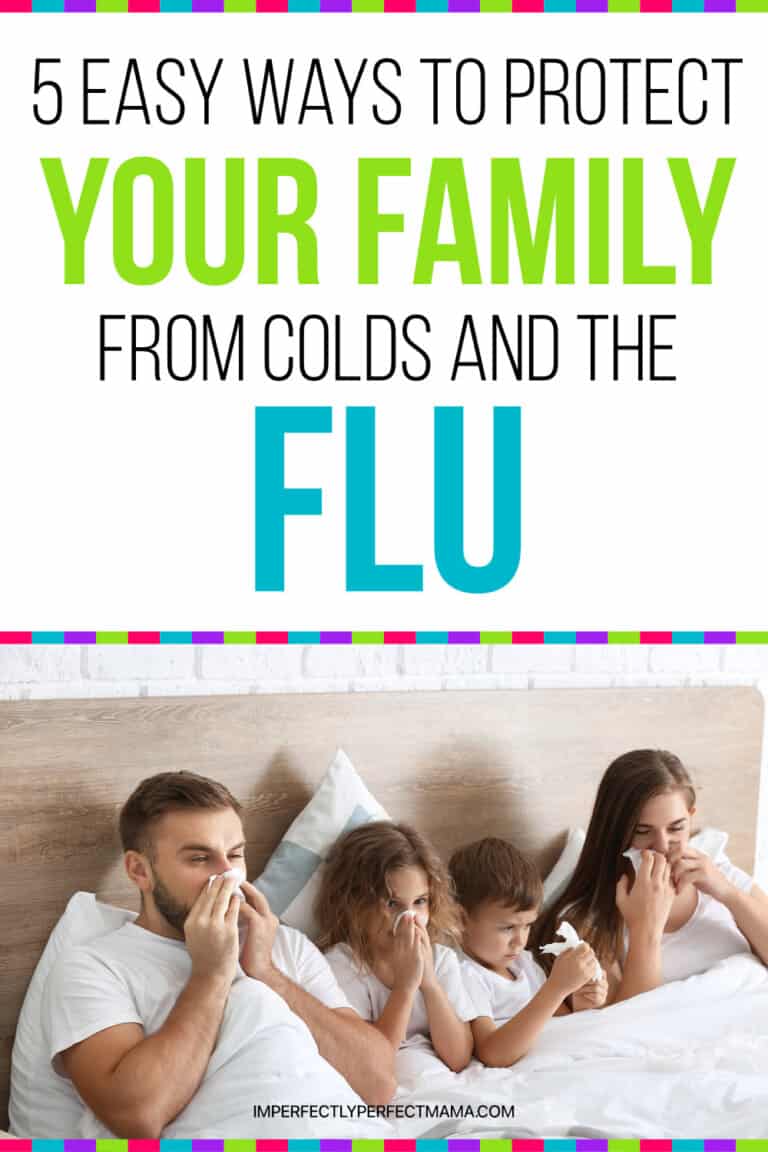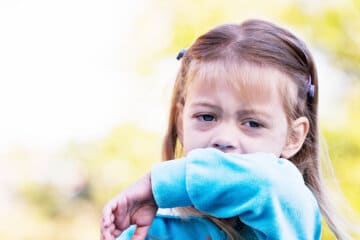It starts with back to school, back to routine, back to group activities with indoor gatherings, and back to passing around illnesses.

Cough, colds, and viruses are as dependable as the holidays.
Maybe you can’t dodge every single sickness but here are five ways to cut down on the amount and duration of illness in your family.
Wash Your Hands
Wash your hands frequently.
Such a simple yet effective activity to decrease the spread of germs.
The ideal amount of time to wash your hands is 20 seconds. That’s about the time it takes to sing the birthday song two times.
Clean your hands before touching your eyes, mouth, or nose which are portal sites to infectious agents.
Keep hand sanitizer handy for times you are on the go.
Wipe down commonly touched surfaces regularly such as toys, cell phones,counters, knobs and handles.
Stay Home When You Are Sick
No one likes a game of tag when the prize is a cold. If you or your family is feeling sick, stay home.
Follow the Center for Disease Control (CDC) and school guidelines for when to return to normal activities based on your symptoms, and seek expert advice when you are unsure.
In the case of severe illness, isolate yourself from others in your household when possible.
Wear a Mask
If you are experiencing cold or flu symptoms, wear a mask when you are near others.
Avoid being around others when possible.
Wearing a mask can protect high-risk individuals from being exposed to your illness such as the elderly, immunocompromised, or small children.
Cover your cough and sneezes.
Discuss Vaccines With Your Healthcare Provider
Flu, Covid-19, and RSV are the three most common infections increasing in the fall.
These three viruses together are commonly referred to as the Tripledemic.
When multiple viruses surge, it leads to increased emergency room visits, hospitalizations, and healthcare capacity issues. Several vaccines are available to protect yourself and your children this season.
Yearly Flu Vaccine
According to the CDC millions of people get the flu each year and hundreds of thousands are hospitalized. The yearly flu vaccine takes up to two weeks to take effect and it can reduce the effects of flu-related illnesses.
Covid-19 Vaccine and Booster
Covid cases are on the rise this fall.
Discuss with your provider if a Covid-19 vaccine or booster is recommended for your family.
Respiratory Syncytial Virus (RSV) Injection
RSV is a common virus that affects the respiratory tract.
Almost all kids are infected with RSV by the time they turn two. Most cases are mild but some cases are severe and lead to hospitalization.
The newest therapy to prevent RSV is a monoclonal antibody injection given to kids up to 24 months before their first RSV season.
Talk to your pediatrician if this therapy is appropriate for your child.
Take Care of Your Body
Your immune system is the strongest when you take care of your body. Simple ways to take care of yourself include your diet, exercise, hydration and sleep.
Eat Well
There’s truth to the rhyme, an apple a day keeps the doctor away. Eating a balanced diet that includes plenty of fruits and vegetables boosts our immune system.
Avoid highly processed food and treats high in sugar.
Move Your Body
Exercise isn’t just good for our body and mind, but also good for our immune system.
Exercise can activate cellular immunity by spreading immune cells in your circulation.
It can also decrease stress and inflammation.
The American Heart Association recommends 150 minutes of moderate exercise per week along with two days a week of muscle strengthening activity.
You don’t have to be coordinated or do anything complicated, a brisk walk meets this requirement.
Stay Hydrated
Drinking adequate amounts of water helps hydrate your body and maintain a mucus barrier to prevent the entry of bacteria.
It can also decrease nasal irritation from coughing and sneezing.
If you are ill and experiencing fever, vomiting, or diarrhea, hydration along with electrolyte replacement is vital to recovery.
Get a fun, reusable water bottle and leave it out to remind you to sip during the day.
Go to Sleep
Studies show that people who are sleep-deprived are more at risk of getting sick when exposed to illness.
During sleep, the body produces immune fighting proteins and lack of sleep means lack of production of this important illness protection.
Adults aim for 7-8 hours a night while children need more.
Having trouble falling asleep? Try to create an environment that promotes rest.
Try blackout curtains or a sleep mask, ear plugs, or a sound machine, and turn down the temperature to encourage your body to fall asleep.
Fall Can be Fantastic
Fall can still symbolize the changing of leaves, pumpkins, and hot cider instead of tissues and cough drops.
Getting sick is inevitable, but supporting your body can help illness be few and far between.
Head to the store to load up on soap and hand sanitizer, have a plan when your family falls ill, schedule yearly checkups to discuss appropriate vaccines and take care of your body.




Leave a Reply